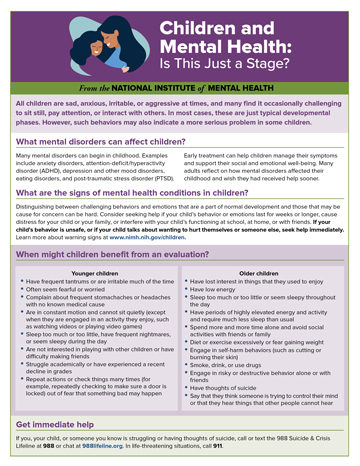
All children are sad, anxious, irritable, or aggressive at times, and many find it occasionally challenging to sit still, pay attention, or interact with others. In most cases, these are just typical developmental phases. However, such behaviors may also indicate a more serious problem in some children.
What mental disorders can affect children?
Many mental disorders can begin in childhood. Examples include anxiety disorders, attention-deficit/hyperactivity disorder (ADHD), depression and other mood disorders, eating disorders, and post-traumatic stress disorder (PTSD). Early treatment can help children manage their symptoms and support their social and emotional well-being. Many adults reflect on how mental disorders affected their childhood and wish they had received help sooner.
What are the signs of mental health conditions in children?
Distinguishing between challenging behaviors and emotions that are a part of normal development and those that may be cause for concern can be hard. Consider seeking help if your child’s behavior or emotions last for weeks or longer, cause distress for your child or your family, or interfere with your child’s functioning at school, at home, or with friends. If your child’s behavior is unsafe, or if your child talks about wanting to hurt themselves or someone else, seek help immediately. Learn more about warning signs.
When might children benefit from an evaluation?
|
Younger children |
Older children |
|
|
Get Immediate Help
If you, your child, or someone you know is struggling or having thoughts of suicide, call or text the 988 Suicide & Crisis Lifeline at 988 or chat at 988lifeline.org . In life-threatening situations, call 911.
Where should I start if I’m concerned about my child’s mental health?
Being proactive and aware of your child’s mental health is an important first step. If you have concerns about your child’s mental health, start by talking with others who frequently interact with your child. For example, ask their teacher about your child’s behavior in school, at daycare, or on the playground.
You can talk with your child’s pediatrician or health care provider and describe your child’s behavior and what you have observed and learned from talking with others. You can also ask the health care provider for a referral to a mental health professional with experience and expertise in evaluating and treating children. Learn about ways to get help and how to find a health care provider or access treatment.
How is children’s mental health assessed?
An evaluation by a mental health professional can help understand and clarify your child’s emotions, behavior, and current situation. Based on this information, the mental health professional can decide if your child would benefit from an intervention and what intervention might work best.
A comprehensive evaluation of a child’s mental health usually involves:
- A parent interview to discuss the child’s developmental history, temperament, relationships with friends and family, medical history, interests, abilities, and any prior treatment
- Information gathering from the child’s school, such as standardized test scores and reports on behavior, capabilities, and difficulties
- If needed, an interview with the child for testing and behavioral observations
Asking questions and providing information to your child’s health care provider can improve your child’s care. Talking with the health care provider builds trust and leads to better results, quality, safety, and satisfaction with care.
Here are some questions you can ask when meeting with prospective treatment providers.
- Do you use treatment approaches that are supported by research?
- Do you involve parents in the treatment? If so, how are parents involved?
- Will there be “homework” between sessions?
- How will progress be evaluated?
- How soon can we expect to see progress?
- How long should treatment last?
Find tips for talking with a health care provider to improve your child’s care and get the most out of your visit.
How are childhood mental health disorders treated?
The mental health professional will review the evaluation results to help determine if a child’s emotions and behavior are related to changes or stresses at home or school or if they may indicate a disorder for which they would recommend treatment.
There are several treatment options the mental health professional may recommend.
- Psychotherapy (sometimes called talk therapy), which includes many different approaches such as structured psychotherapies directed at specific conditions Effective psychotherapy for children often incorporates:
- Parent involvement in the treatment
- Teaching the child skills to practice at home or school (between-session “homework assignments”)
- Measures of progress (such as rating scales and improvements on “homework assignments”) that are tracked over time
- Medications, which will depend on the diagnosis and may include antidepressants, stimulants, mood stabilizers, or other medications. Medications are often used in combination with psychotherapy. If multiple health care providers or specialists are involved, treatment information should be shared and coordinated between providers to achieve the best results.
- Family counseling, which includes family members to help them understand how a child’s challenges may affect relationships with parents and siblings.
- Support for parents, such as individual or group sessions that include training and the opportunity to talk with other parents. Parental support can provide new strategies for helping a child manage difficult emotions and behavior in a positive way. The therapist can also coach parents on how to work with schools to receive classroom accommodations.
Learn more about treatment options for specific disorders.
How can the school support my child’s mental health?
Children who have behavioral or emotional challenges that interfere with success in school may benefit from plans or accommodations provided under laws that prevent discrimination against children with disabilities. Your child’s health care providers can help you communicate with the school.
A first step may be to ask the school whether accommodations such as an individualized education program (IEP) are appropriate for your child. Accommodations might include providing a child with a tape recorder for taking notes, allowing more time for tests, or adjusting seating in the classroom to reduce distraction.
The U.S. Department of Education offers information and resources on what schools can and, in some cases, must provide for children who would benefit from accommodations and how parents can request evaluation and services for their child.
- The Individuals with Disabilities Education Act consolidates information about how states and public agencies provide early intervention, special education, and related services for infants, toddlers, children, and youth with disabilities.
- The Office for Civil Rights provides information on federal laws that prohibit discrimination based on disability in public programs, such as schools.
- The Center for Parent Information and Resources lists Parent Training and Information Centers and Community Parent Resource Centers in each state
Many organizations listed in the More information and resources section also offer information on working with schools and more general information on disorders affecting children.
Download a PDF of the Children and Mental Health: Is This Just a Stage? brochure. A Spanish-language version is also available.
Source: National Institute of Mental Health | Children and Mental Health: Is This Just a Stage?, https://www.nimh.nih.gov/health/publications/children-and-mental-health | Last revised 2024







